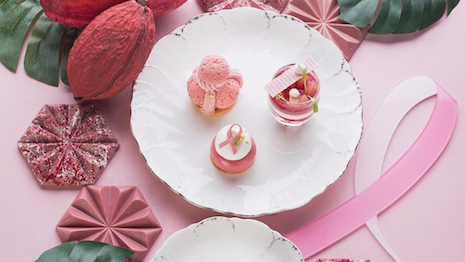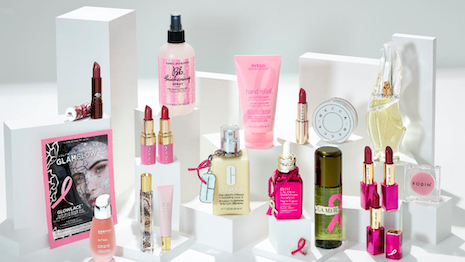Throughout the month of October, luxury brands are leveraging special events and storytelling to spread awareness and support research efforts for breast cancer.
During Breast Cancer Awareness Month, many brands have annual campaigns and events to raise funds for breast cancer research and awareness organizations. As luxury consumers become more values-conscious, it is important for brands to share their philanthropic sides.
“It is important for businesses and brands to show their support for Breast Cancer Awareness Month for several reasons,” said Rebecca Miller, founder/CEO of Miller & Company, New York. “First, it is a very scary disease that attacks the people of the world – no race, religion or financial status is exempt.
“The global workforce is comprised of 47 percent females, which is the majority of the people that develop breast cancer,” she said. “Knowing that approximately 50 percent of your employees are at risk – it not only makes sense for a brand to support the health and well-being of their employees from a financial position, but it the decent thing to do.”
Beyond pink
Department store chain Bloomingdale’s is hosting its 15th annual Pink Campaign to support breast cancer awareness and treatments. The retailer’s efforts revolve around limited-edition merchandise, in-store events and other shopping incentives.
This year, the Pink Campaign will support the Breast Cancer Research Foundation (BCRF), the Carey Foundation and the Marisa Accolla Foundation. Bloomingdale’s also collaborated with Ms. Acocella, an author and cartoonist, to create an exclusive coloring book inspired by her graphic memoir, Cancer Vixen.
Pink pop-up shops feature selected Estée Lauder products, and shoppers can also purchase the retailer’s Little Pink Bag and strawberry frozen yogurt. Nationwide, Bloomingdale’s shoppers can participate in wellness-oriented activities, including CorePower Yoga and K-pop dance classes, for a small donation.
Luxury retailer Nordstrom is also touting its breast prothesis program this Breast Cancer Awareness Month. Available all year by appointment, women can meet with certified prothesis fitters who are trained to fit women for all intimate apparel following a mastectomy, lumpectomy or other reconstructive breast surgery.
Nordstrom also offers post-mastectomy camisoles and bras, as well as free pocketing on any bras purchased from the retailer. The brand works with several major insurance carriers as part of the program.
Stella McCartney featured breast cancer survivors in its annual campaign
For its annual Breast Cancer Awareness campaign, British fashion brand Stella McCartney shared the stories of three inspiring survivors. The label is also donating 10,000 post-mastectomy bras and has created an adidas by Stella McCartney post-mastectomy sports bra.
U.S. jeweler David Yurman is also partnering with BCRF for a 12th consecutive year. This year’s BCRF collection features six pieces, including a pavé pinky ring and pendant necklace, both with pink sapphires and rose gold, as well as a Cable classic bracelet with morganite and sterling silver.
Luxury hospitality brands are also showing support for Breast Cancer Awareness Month.
At select Mandarin Oriental properties, guests can participate in themed activities throughout October that encourage them to support local and national organizations.
Mandarin Oriental spas in New York, Miami and Washington, D.C. will be offering an “Inner Strength” treatment intended to build strength, inspire courage and induce positivity. In Taipei, guests can enjoy a Pink Ribbon Afternoon Tea or a Mandarin Fizz cocktail in a shade of rose.

The Pink Ribbon Afternoon Tea. Image credit: Ritz-Carlton
At The Ritz-Carlton Denver, guests can partake in special spa treatments or menu items that will benefit a local breast cancer organization, Sense of Security.
A “Pretty in Pink” facial will include a rhubarb face mask, a rose gold eye mask and rose quartz lymphatic drainage. Dining patrons can indulge in a “radiant raspberry” tart or a glass of Chateau Minuty Rosé.
“In founder-led companies it is a very personal endeavor to support breast cancer awareness because the owners have had very personal experiences where they have known people who have succumbed to the disease or have fought it, and by supporting you are doing something personally to help,” Ms. Miller said. “On the public or company side, it is important that customers feel there is a personal and human side to the company and that by purchasing products a donation is made to support breast cancer awareness – in addition to the company making its own donation – the value of the donation multiplies because consumers can help contribute.”
Meaningful marketing
Aside from Breast Cancer Awareness Month, many luxury brands launch special initiatives throughout the year to share their values and philanthropic missions.
In honor of International Day of the Girl, luxury brands are launching new charitable partnerships aimed at achieving gender equality.
Marking the occasion, Clé de Peau Beauté and Chloé have both forged new ties with UNICEF, while other brands are pointing to their existing initiatives surrounding female empowerment. As issues around gender equality gain attention, brands are stepping up to combat everything from violence against women to child marriage (see story).
Luxury brands also looked to make the LGBT+ community feel welcomed and supported through special partnerships, events and merchandise during Pride Month.
As consumers become more likely to support brands with like-minded values, luxury brands are becoming more vocal of their support of the LGBT+ community. This June marked the 50th anniversary of the Stonewall Inn Uprising in New York, bringing more gravity to the annual celebrations (see story).
“I think to be authentic, companies need to share and tell stories about how the donations are being used,” Ms. Miller said. “It is not enough to just collect and give – you need to tell the customers what is being done with the money.
“I think philanthropy can be differentiated based on so many different choices,” she said. “More importantly, it needs to mean something and not be associated with the fact that the brand will gain something.”
{"ct":"4sTjX7imvqV7vSkFsOIvB6oZcOSy3seb7olwc1eRQYX3Q8XO0n7Mz3\/E\/Nz+7\/sp\/oM0CsRkN6PDOt4mnDEaM9MLO8DWsU9LT3iET3E3VWI9HArOX4SSKCxAWNEZkjlKAEft2W+G3bi6TQ24i8H5UadbPc4Jc6KQctJ\/kEbzidV3xI6\/sOXRhseq6j+CoOzOP16FVRaXB+\/ACVAOH5dO\/LQ17kicBqJDbaAu69ZXRKRCYxuclthJOMKwv4MRLj4xW5\/n+yh1BHmy9L+847HyWiAO2MxtlYWdQ\/193th961rAFig4fcPEKPKqQphBq+b5lVHK4ip3exfwWfpdrqEBFbRkKfFoi\/F7\/X0EeCsj4IsWevDkX8+cyiBNvSNoMLalpdYGdTPJXuHhI4yJJt0onO1BTZuseoysAe10k4eMim751VliUvQuGKDwP4eI7Pj4ri8MQ6V4sz3Je2BSE57FOhp+quFiTVsY796QmUYg4n\/PCX5DpthkeUTST3RdJGSAQW8vwHC9MIi3vKv9lzIZdFuNo3CmY7LzX+qhVcPuOmDwN4fblfl6uC8O2t38MD9TbZE5sG7UXgHGejAk2Bor9raXIYAzR7kESavI8\/WEDZFBClh6cNp\/oO77i\/HdfP3wIsX31lVwkglIPkpG7\/TxnZIPxqMS7tak++zR+HtCpOUMJGvt6HTdis5MbYsgODUP14IXss+iaPomqFErOi9bNc4s4PqpU\/0lQqb7gDxNtq7RTCCtcM4l4e0YLGICm1e051uR6JZm5r42vYC5k9xhc59LoOn1vugtXNbP\/pOqBqCjJQC1JWQ7wLiRP49wrwFtax2L3yf+1AGt8p4F3rCXQhG2au6mSdwgPwsrPhYgaYNJe4CzB2dekksHE2x3E32MNX7KvI5JmsSlbgqNHLurylAnt8CgfgvkGPXr0JOSimY0pfT9s78Mer6Pq\/I52ACSF5Ub3zTJAxGlV40XOyGCyI2CDTTGySjS72cFMFjtzu4az71Fm6xqTH5B0YKoIVUxmTJ1i7Ynm6GVRUbmsswPiTfkdbpkyIbF4DX\/yfHZAp2QhLlHuVH1d6fOHOCpyS99sOnnjzI8eAxTFHHYERaq1Q2DYSMacZB5gsiMZ9KP5O9tp7iD+v2W+gjcJC1wDVEEe11PNbdpRtgQl34MWAqlo5kW\/zjEy0U+U2MoBC2HKCDNeizieuRtqjl4bFXFsnX4gATVtAfmdGlO7f2wE4ddYwvi5Mzg4vrvR07bhyB3\/h9Mh+8rG5b92OZUPjiIR+GvTQkO5KhybaSGZlpFCqYXgm0mXhvSlpDf7CuwXHhI+Mj\/D1iE0NnFsyDRVojAk+5WHJGE0RFUEbOXXGq4VLzSAkHXYjGIdnUOcIqWvofAim4qzgLN6JZQRZhhrL9wCVdzpkuFPr\/M2vGOp\/dJgenhWQL8PsBTp7Gwa8XLF\/3xs3rOY8pxeYQv9VtDCKmIdZ9tzxncPC4tBn518NQiIZQ00VhrBngNwhVKPKdUed5zKQl3BizBzmHab6yE754HsQUldNSWPTCi6ECr\/ynND2j0IgTFjhkwx58Fei5GcY7VAh\/Lbn3Pt3rnIRazSHQZCei0stm9p\/MseCowJjeokj+1QJkqCiP2fSfzjqbh50KSa5RSaQKEFcJKzlXU\/7v8\/fviOziOSbEdxQPjVUb\/5OB1\/jZ\/W4P5kgt+ig3dLI8tr54H0663cR0XGzgASkcq+JDo9AGC70iaTHMEIAE5bXxhRTJM+fmAAWcmCfubosblAumrCeEPVr67sp\/bFTfuXOs\/\/FokkDQe+Bob5lxUMZvFoOpPXNs5pRnXJxQ75+rK6FqE8wpr3SmpdgGncBhmG\/HnlSDQodm2o0NJByI3P+gS1oXqKceqa0dVLLjTTpvfTI+tzxJgeYA5yoPQuqQK7Ni8NylTO+I7b65kETOyU\/4+BJNGv9l4NVWMUw6XJ5CRPq4K5GZJtgvNx8bNwj68R3C2Ngk4BxSot0i77hPtYlFmU+\/T7RLQCQkNEN1vRCgX7Gb4+m6Scr6sD88Rn6IxzoWiya7LbAGx1D\/NYMAdzYCT6IOkkwzzjHj+wWj5VczN5c8G9Trq5DMuRdgKm6dj+3sGNrNPMO4GlM0DSlMmBNbNHNiaN0FpgCO\/kJoQRo3uG1RkzO8EjZKq2i873bOEbJstXFy8iPb0K8T\/j6e9S1tZFwGL9vLZiUhowM4Np3hPqH+jvMamiRqdGOHZtoHuzwMJxWUwlFcpu92zhJAYGIBnT6+NshpMwuaogccLVrqI1V+ArQAsLGotXK2dodD5q0YzeQI5ufXA7j41C\/zy0fvLMOAAlTBwOX+5gv9JaOiuM2DTKAxtUCZa3OATd+Jh2ENtvKIlyD+tihdKfV0PmqG9WSluRBK2ofAe609AorseSPK3\/pvhKSakhrX81+jRhSwtoA2cHwgJv9t+RSZZp\/QLFj\/ODmIo7IVPddvNr6C+fj\/xc0Uk5V8zkvlEQLggFAr0udXVsRjjziXowIF\/7L2fTtyn\/vnX2cL74YmcFn\/5S0+uCbR6LXXiOqJvDTd3qQ4escWV8gZ6v9Kh9weIkYmtBf4Ysjx8M\/eTCw\/mz8IxQ7ErSScyxc0OiUORZeJaqMkMQqR3BWfPSZ2cttYV5BWTkyWQN8K6VUbEGCnh6AR678lSh4SIE6oLC9ki7iF4a0tAOZK4oKMopjnBwhtPYygdVa9Sz1c4e4JKqlMaqKxPS8TEe8pZKx4Tmq2q6hb4Nly1fZmEWn9EGyvpkZsBzTXybgSiK4H2iWB5IvfQeDYgJlby2S5npMjFQW66g3oMmUzWuvv4mQSPOGS4MYVF\/0g1Ldr37RzI7E5hFI++DAkTtvbMztCJ87F1L\/Ub9yZWWpWr3sKZgml3zwK\/aZunMimY2ODe+vsw594Iyyf1MT9NtCisnpV\/ayVHcOPyHqhs31wkVJdgQPMeUPbnA0XUkAUG6F8OE+8ddLSOLN5w7hVDJfUaNewnoIx3c+RE\/U67BqU\/3Dl8dU76+eObOAoJR\/Cvi0vNxAPGtTJw9WQK\/KmVwmnbrJIUgHutMmXNEKga2bYSbNi0oBS2bRFbB5L7krni28thCab253tZNC9MWapafHCDXHMvcaFpG9Vp93LTjd3QZKJWDddcfkxnTtgB\/GaRG0H5RjYl8sUGV3+c5Oq\/\/1\/ewrfCFY0DgqS79WKmVJkMJJf52azNebt5i0pI0KRkWWD+QnrPOD9loLOyX8lDR28uWdyi1ZcTuCG2gX+pOrhwii\/yts1Ig8Rh0y3E\/zc9ZrG+cp5RzzifQfO1\/ldk638G2ojyI6LKYrccZqqob5OW98VuCALousCGBqVMw3DCFvS3eTMgKpmTysxQuqUhD4WZdYZo7wwlxjpZMCV63jTNLCxpIQPv8LGfDTytoggKu0+Eoo0x0s9SUb4lKSc6z4QjQbgQcduTozZgD3m0X3rqjdGcgakIDBjAbtQ1N7lHvLcyGEHBG6NiM3DFY7HoCsFxlGA3KfnlHegWzH87V1054NvpU1aDuGhEyzPowKH9qcg95yEV9ysSIPQz4pYZ6tbz+NGdGeGIf\/h3996BwLdQuRvuSfQCEkBVftK32QB5wH0Yd+hgh\/lFlkJas4bz1fFPfNHAPqqD6YfTC8+\/KfnjPNc2cdp+lykMg+LziZRRIi+WdqGc5cw3z9m9PxE9lKpKo5EHir8jAjdqQii9yqnCJ8n3ujQJU9+HjwW17ejLulv7srOwBZHlMDuat995HDMw8CmPLeNY2TrfJmY619iofANYTsv\/LjArhQut\/DmixXhPYsHZFjVECJ4NoIBjOLMQHaCfGRJZ2weSpvuH09Y7urRJHU11UvwwbfakWZpiV5iO0lpLUVVYdnkIwHGqV3lwD9C5YbovBctknqaWEoAGRxL0T+Axi2q+NBwHhQJT\/l0AvS2gBfQcoRL8MN7xx6g2uwT1\/WdSnUcXrMgsfazWpZtDPq5naTptXYSM5AirrDxGUHJo9jenyw+b1FyAIyA3Mvp5TOcAcmB4i736EhttCFeJKczwnhDc1piVVsZqsSwYBJ7Q3oCb83BT+EEitTMZZX\/V6xfoakemiQX4nm1fiFE5dGn7au2mDX2cQ6ubERzcQ8fYSdv70Ag8IYs\/Dr1buWJsLI0OdfXMh3cirwMvnO51XM24GDV7AscQ+OKqNiptKYI+fwQshxbN8bJFKkj4hAG\/ZSJN6wKI8B7+ZmI6mEmHygl5W+bAubV3FN\/dTCtLBKow4DS7DDVvqo8lqaEMZd9q2njp\/nIVDPulGJnve2eHBxU\/u+1iD5Atlkj\/nRTmY5ZHTO7ioSZ\/bpE7gNimsdyIT5cglSXL4BatVjvAphQIR\/tck\/vqdhBmCMO6HGiekMOrx4Msa6ZsPLkKzfX+bEjMLV1MKuCV8brHs0UmVHZXMo8lD1EnxZjP2TNplC0xOst\/wXlhxyJCpvblAdfTQ+sB9UyFTlNxWgW9P3+5uKsw01\/S2xcrUJAo8ZO9DNPn4iijWOO7EBm5UKaPcFghPDP1v5ew8pdOws1Tm3r4plt85odoTStPH\/IZ6e5ZcQywf1OfEV5YXVURG1vmdydMWbN2KThs2EZB990XOBlUp62l1Ey\/E0NkV4pvkzoEIssmQCtVuANF3FGJbvr\/Q8OOdq4pO0FRu3u44bXJX2e63okNECp3fEuOc1mGpT2rM+5WbMaQvy96rZ4HnXNCM0q+2UCcpZRbhlXtF5hLrF9NZsK2efFUWrFGK24UTL0vE5wrAWW6T7efwg3jevYNU7hs\/eOBP6lbHP5+Bp6+GMThi7cl4p1xEWtDGe3nKtU6tRa34+VaNzwE5jl1UjgyT\/+sD2vbGBr+AMgGW1yo6rMZ6CvgSvUa+8UgEFrbi0\/fXDMrImD3JuhR0WOU8z7Clgjr+rPs\/wYcuI4TI7BxaAtTEfbNJmGehuypEiEJWdpTjWBxls5XH9simR\/x6Py9jvZe5s32+fACYtKWRZsOtpKr8ChHzRGggZzR86ODBeE9714JCxTKUC1L7Nl54h5OGrCyW2BckaSVv5hFmWUEPsNEOwtZzhCkxeMcj5+0uiwQ4YbDLYD6\/tzk+uuW3XT\/oLM1OZ34CrC9nCB8DAmNUQ1l5G3hUlzjBUeIQadI6u7SMfemaHcihDWWPmwJ6WKgSHGjf0i7D7GSCYZp0+SOvBpJkt1CBepel9GR96o8f22QpNctqsULTTDap0rcLams6JTd1dTWq\/pei1SHt6gdPAS1oUfmkKGIMxoOkdcNiAQOpEFxTR4+88M9dVOyS1r8DZvZakiQzO8vjPObesAW3sFdGcHj+nSmROOk8wxzrzhlKIbCDprtjUw9ZCd6zSM+QyAalvi9eJ6fYh4n7V6eu6+hxLsw+XoY5MJdpDI6Ss0dYIQGXN0KAQ7FbxapFKg1CXcluuLyU5P1a0RQyhJR1m7OAaIgSD6seBP14fDehrjJsW6EyyHDxL7+q2JMHbk8a7QK5Cht5fUf4kPsBZti4UwSPXBdAL4w3ud0qVBKoNyjeZ6SufXquw26oykRugg8MKZXNDhm8Qv4zispme7xe67cfRJ+uwA7l6zRY2IcAkUhHYkGx3yy47KSHDKnxH6Q6mbEuHEAg00PXk\/XxSj\/z1jORm4ehB7fyv0GIZgzTfWEp0\/gXnJHPaTn2CZiw3OMZ4\/ik+BcG87\/FT2bcaD6LTyhXaWH1LKQdv1OsGsAVFWkQYyrLj4A6iJDm+ikelplx6F9mgR70g5GccvBeVo6OzowAI3p1+WHOmrfZMvZTeZV6rZDnwYj+K1iBK4bnrs3z\/uGYoHnNKCfHri+hQ0wjM3Yo\/AbjA2tv1J5\/b6gA1Z8rCiT+O9rv3h0K8Mz5vDyv+RCs6w7trk1Xpw2FGcHhCK3C9qCU3kZ5N0yrXsmqyfmKGGw3x5LG6mN5Oe20LCGd86EMeDa0zzuI6c7ptHC+8lT3U1Ux4rtV38DyqVRjfNqlec1AYa8vY0lUFTAgXn+BgywaOlVAb2Ca7lcAQ2lWuGMY1PS\/dz2ZKkkt9KkB7ZXvVznPfREKLJ6O4E52XvGzqDxqc5FNNxs6KV5jfZEVTbGsjVkcJ2O0LpiwgrNGQJ15oJhJlus04kkqvDQ6YWJOGuiD6Z5rUiJEgM34FJcjpLsiiTpMdRKfjfhTUR6qZLtZGtwFGTSUMjuJpeslDVCI+j\/4p7ViqTr+KoLXPrroShpD2NdJT1pbLH7k62gnDPDMi0fvnoPI+XrEO3K3T4hAvQDPBqBcvnMrw3pbr05N621SVJYWpl68J\/DQhGXcs3dMoTBic5TNMny9aWpwTsmaHvfe7yWROnV5ZEcdhu0MzkVjWN8XixvI4sI6yYr\/5I1u01bTXN9R4fpaYn0PlooDi1srXtlIqZP0YFRpDnpRnCTM0g6aP02eraqALW+MsvyoZhYXpnUYpYT+KFMNhxGjF08vTQNNR1shP0BFlxRWWP7XpCUKoCTLIgiu\/oeI4DfQXvX66B\/Oots4GeR0AXcujx57tmbGqXAM44CF4jrpWNkcbFbH0rIJhuv5whur1qCPJWNQENoVzSsVxiYW0KrHWBqQNTkwc5qUCi4ZEt8VvH6JJxu5GesjhSSedYh04SUnZTOJ2cjoXyNxu6vrLnh3ySqfA6yXAsdYvPmX1m6ZIfWUEHUNzBNMl3vEH60oWS7qGU\/rEjHuZRv31J1Oa3mMBSKoPiM9pINwBldTftJVESC88h6X8Qh59z2Z0Wi7oGI4PVWVLh115kngeQx32+6o48\/iafQPdKAUM4+BgL32d\/A4VnKnYDwtwhSDf56FedFh5kZRSqTZDUveS\/grH\/YiWZagVaIFyzBYAnKeBIJpONDjF\/sIw4UGYT\/XBIho\/Z7uxmKNH5AE2V+X7dgL0aj3kdWbnaS491RFoK87OHS0xzopROhdA6Yi\/PkdEszeIxti6Tsm5ZR+3+P1trJOScZ2a2GjcpRDrRIG0kcyygRrdlzw12\/ULpJMwqAvmCaV2d22bB5eQ5Dscy0z5G5xcpA8sifz6oXctPY40htjsVmci3P7upbTIvuQZ7oiNTre4F5gJsTaObBDs56Hf3N\/OEDQtyYJZlr4cDQTFLf4R5I4EJ3paq5XHVW4gRIJhF\/JhOyMRNwchiUSySg7+R\/+DNtYBPFcrCSYcFnttODOvP1ueOKeIKKUqVGMKI22tqBga2DhUmNSswr6lGEM11i+bLi7GyI8t1\/z44g5dtB7cVIj4G55Uq8yD9vM4ISTJ8bLW9o9isU6oCl2LEQ5yjyRQ9xv6fDU558HtzYBYN6MmhwoEJw0MsDbBWOIFFS7G1R4jkREwq3Rte9RPz1ftJjyPm5n84EM79OUL7BP3H1sn\/gwdSOjEvSMyPeZB3dJi+kkIjfxI+CQalRDElhsjjz5gfQC6NbXBDMJvzxdhohkI2fVd1KjveDELZidoHIK58NU2hQ7NEGC13ZmmnBpxGY3URXw57q4O72ibw+HWQr\/dUp\/Leqi5p0tDpJY+UtRZj0VjOilNtu+TMcQKDE8DbSK36Om7nllomYB3I6wHU3gS0bavYgtj5NgxC7ovXz6Yb26aIxpvls49pppRsfuGsxg4OT+joOKcQEKZUh9nojlYR0AyMvqWBWjV\/zGIuAWA+hH7H780Fmd5UwH7sKFaGtffWcQ3pJSabhjpKjA7jX+iEjAAFpfOlXHqQgkQDI25+mqjTSNhu7x\/wKyri+NRTOeq+c5T1STXJi8fUyyLf67cr6enCQ+9gMfv+O6Lgu65SRD8d0Vx2et4Ot1ibEop2znbfNWg8sVlFmCHPLS+i49f4hAYMqu9TT6YG92Yn37wTyI\/Gmnl6JL0673SfStTvUSOzxjSv7Wqor9+l3IrAEi5dTUyXRN7+ws4DqJY1RZjjdb2GMI7UyGec+hVAI\/YF+wgt8UheBZ087yC78\/Kpi3Vz6b4q3CeLVPV6vt9tQ\/qV2pKMaJfByeYk\/1LXNmwEIjAi5PB2tS1eLAtYPq0EobAvIcTvclblo8r1QFhL\/\/dEW\/gR\/Y2RwIKdX0cJo9ryV24R3fngw8N5vWN0IfKwuZWGRKewvBQjyRN9IpNsFvJzBP59ARAqdjmSHNOdR4MhXhS9nyJOwPVOwG6uGbJzGjkkt0FbOkrjx4hjrdCB\/Ds8I+8Ao9+zk83wUGmYcnKGXNg68GcwjkTXFsqNcCw20APNVh81Hp1NA1cOvc4gNJf+sRw7TZKO\/E42ITUnRVxIDiqG+Z1Rm0fBEuamfheEOcqM2SHlNefQ64nTTwhIm7V\/vZYa\/FG0G\/vhYIaMt02yQCB7qOt8HdMcBvfUyR0UtkaMolijV8mw68QLwDrgBJABH\/AvgAYc8+CtErwqgVRUy3tL+UM5mXP71gSVcWmC8d3PEQUrS+EleCh1jQmlWS5V\/AGEalz4jaCO4EdEyNyZDvsJr6xg\/ot80fHbw+9\/qaQ0ZcEu\/a0jizGld8ZHuLXmK8IVmRHPDaGH+zSzEj8d6sJbwNzV3sAMW8h4xX4I0v7zgQ2v2qf800j0UmwNkAkU\/VJrk1RuyALiqi9gfC3ghYwyNUn5rcgkjK2p4OuEkOK3pTkRZwFg2TYx+LCvID38Y4kq59CsE7uUKGozQ56wvMOfHk8szzbHHrGrl\/YSG4fqMCkQX3QHp22E4+wnDxXXtC37rKkOdPp2CGZNENomAWTjd3GzfNwcBHj50fjs9KO5g9U\/fYHv1mb\/peseJuBfXNka6APYkiGyxTDiJZziYggU6f2o7ddYv+OpEd6ysAxkrBw4B60A47mBCwawQ0ssZipENsD08t4jjtkIQD9uCxDxlpqDWN+BdOVTSZGDJR8DpcI4v6F7Qz+aDZHZ0pSsbXVAJt+AGXwIkJcxq\/qR\/bqq\/vbawxbvl77wFCfYPbJcwXpAy2a2RAckOWUskkt9tO9dWo9rt\/kKWK4mBUYLYsA4OivSCK6vGMeMp+F6Z2UAN\/nqziW3nVWfia0ZpGF0XJKdcnE8HQBUdE6+Y0i60oyCeMWBOfPN5sXjKOGy\/dDQF9lTPvG2eRU3f09QR3f23Su5tPEhNGQwiE5UldEFT4+aQuk75bmhOt0NZnt4KtvLwwDrT7YDYUn7HsdXBY2yHAI+T8Cj7pB0mEZV8XZh2B07yXWw0WUsawT03IvqG7g+NUhsjx2OQllzzC47IGbi8OTCgxYDXDLugkhUkBAb3R5aata7De06KtZcHDVTuqVMSrqoTpJ3VH+UcQumrrIqa83+ejsKudrDoMd+cGr2Zq8slXBOHXap5uE0KZV4MdAMESC32mqJj7RZTQ5z20O1yat+gMIpCvu2stUOsM7AbF7wHsq\/JFHI+D1sjtD432xpW1N+z52IY52sGmGIEg1JRTShRvz86DeBfELfxdMPAwk3NBqyM9ZvpNoMnetGOLmm+OUViEp5aIrSZg7mdndS3IRyIpJqoRCDq4MoOF\/tYJA6xzPkOug4Jh7IyQpn\/0gX2Oo+n9t9YDkIRiLZz7He\/8tTJryGImDYnOCbc+H8is9E3AjDovV6AyT5NhiRJrBBA61ikXvhVuXXHgxdUe18lJLxeq48DDtmelhhfCZpuDh29YkPpLiiC7d2bkycPlp7l\/N3eEotG5E\/WliCfLTfdGCY9tMwp05\/SpDenOXOAj6Gbh+ixA3dnSoS8XnKCU2b5reRN89sHUmDVeX7ZRxEF6OHiaHzvHmzymcfZZu966an6Da3BD2U0\/stNKySO9PA3XlXKKKpm6Hf1x7J1BkfVFmkOf53wCX5T0Xgv\/TA3rGylJ9gpPYGhz5Rw21XldFIdB\/Bh4jP4wit5wE2CNmG+258awDIzwZeOLxyDWbggIUuOP4Yf5V+sEjD04sGVEG2Rml3Nk7BeKV07e7+NMaIugu8XZRj6l+zowaLa2Y1e0p9LWSeThY7QhY782nttOhLSpzFUc\/8kiYWTJbHSAXi8VwabwfHyRSqvmx0aDNCHom5CUyGMLCrRZQ36YPeL3B3PFV7ZCU5nvEUo5fDlxqmnZrBLyTgRhZghsyVfg0VZYDqHy+G0UINLaFYJdMUByyDIHZZgLsDHMabLXcyPaEGz4SWUJf2uznrvAGVCyhkptpghNY5qcom5C6cGQAfy+rPH7H\/527EJc+6G1m7+TdlLEZg1tuCMIDWPn4mLqjkigX5WxaO3YJjATnFBZ1YPZk6OXL9rWv+3JSQo6mBu1oAOfPv46dQRcq6olWfUfuhFTLx9JCo=","iv":"a17710a442493a753167d95df93bf5e7","s":"bf637228bf96f2cd"}

 Estée Lauder releases limited-edition Pink Ribbon Products every October. Image credit: Estée Lauder
Estée Lauder releases limited-edition Pink Ribbon Products every October. Image credit: Estée Lauder